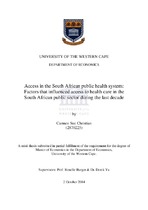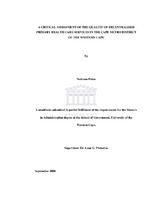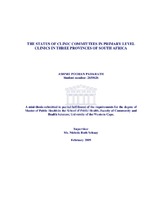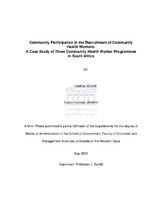| dc.description.abstract | The aim of this mini-thesis is to investigate the factors linked to access in the South African public health sector - using General Household Survey Data - in order to contribute to a better understanding of the role of access in achieving the National Department of Health’s primary goal of universal coverage. Even though the multi-dimensional interpretation of health system performance has gained acceptance and traction in recent years, much of the research linked to it remains supply-focused. The implicit truth is that demand-side health issues are largely ignored, under-researched and ominously absent from health policies. This is particularly true with regard to the access dimension of health performance, where research and policy focus almost exclusively on availability and affordability perspectives of access while neglecting demand-side aspects of health-seeking behaviour, such as acceptability. The study, therefore, pursues an in-depth exploration of access across its three dimensions - availability, affordability and acceptability - in the South African public health sector and aims to empirically investigate access to public health care from 2002 to 2012. It also identifies the underlying reasons for the observed trends, supplementing and reorienting the current understanding of access to public health care. The empirical findings reveal mixed results: it supports current literature by suggesting that equity has been achieved in terms of making public health care services more affordable, especially for the most vulnerable groups of South African society. However, acceptability and availability issues persist. It is safe to say that the availability of public health care – mainly a supply-side issue – is being addressed in the South African context with Government taking steps to address it. Unfortunately the same attention has not been given to issues of acceptability on the demand-side. Failure to fully understand the demand-side dimension of access and the role health-seeking behaviour plays in public health issues threatens to weaken health policies aimed at improving access. It is imperative that demand-side aspects of health-seeking behaviour and institutional responsiveness to health-demand occupy a more prominent role in South African public health debates, research and policy. | en_US |




